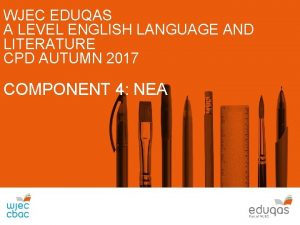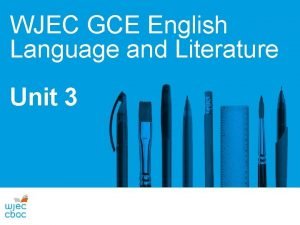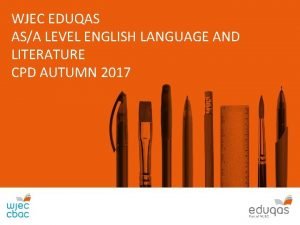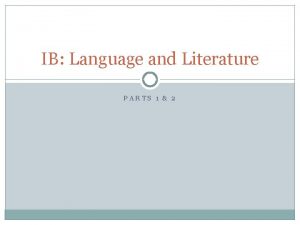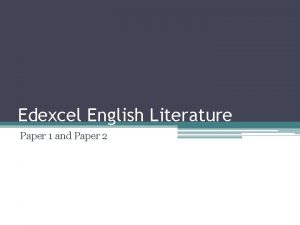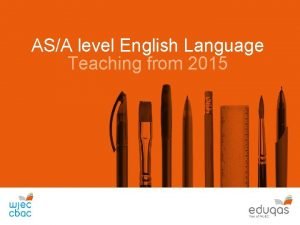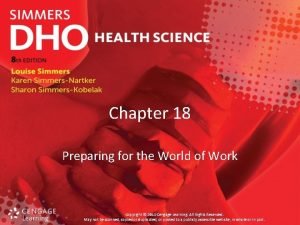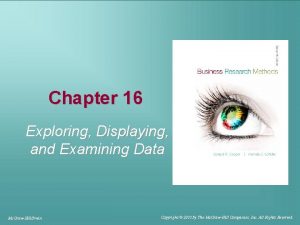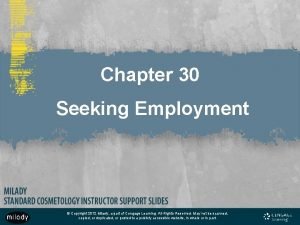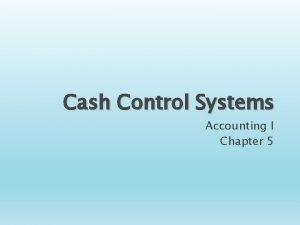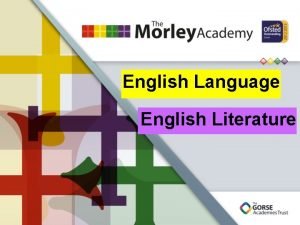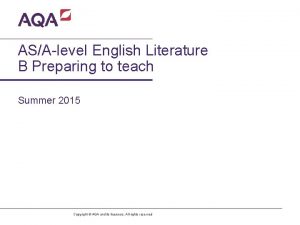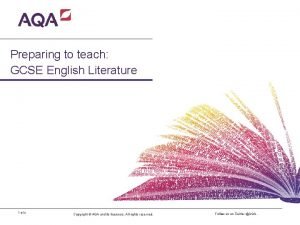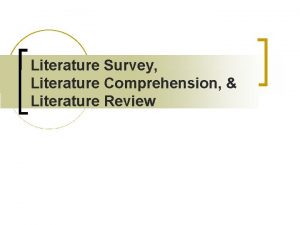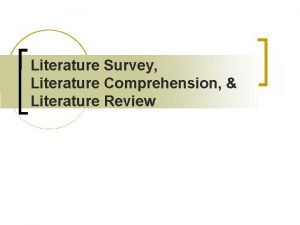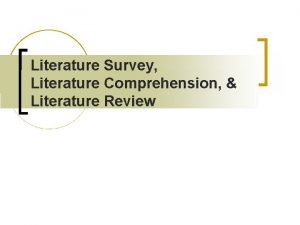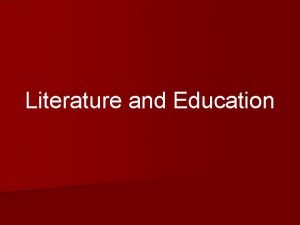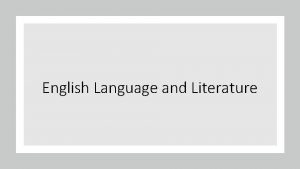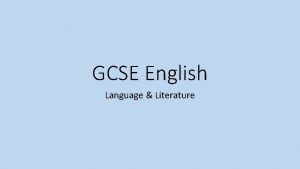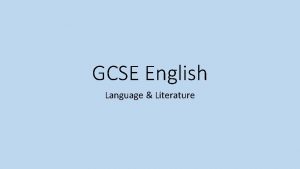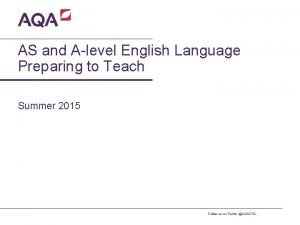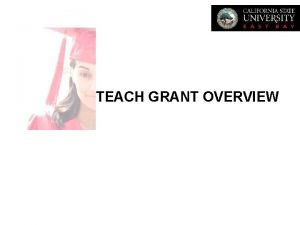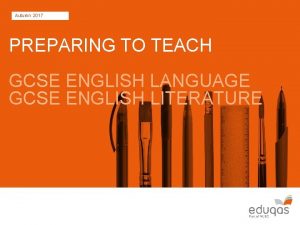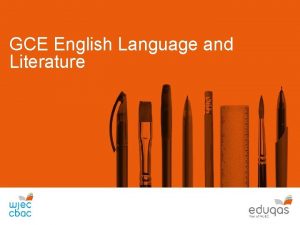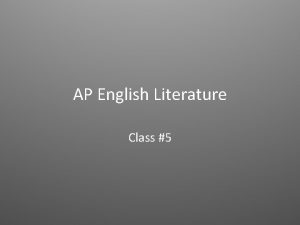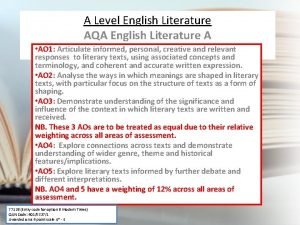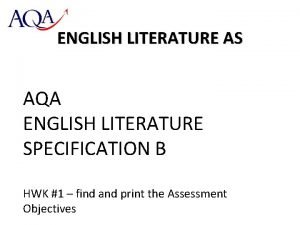English Language and Literature Preparing to teach the
























































- Slides: 56

English Language and Literature Preparing to teach the new AS/A-level Summer 2015 Slide 1 Copyright © AQA and its licensors. All rights reserved. Follow us on Twitter @AQACPD.

Contents • Overview of the AS and A-level English Language and Literature specification. • Exploring the specification's underlying principles. • Key concepts, content, skills and external assessment at AS and A-level. • Co-teaching AS and A-level. • Key concepts, content, skills and external assessment at A-level. • NEA requirements and assessment at A-level. • Support and resources available. Slide 2 Copyright © AQA and its licensors. All rights reserved. Follow us on Twitter @AQACPD.

AS/A-level English Language and Literature Underlying principles: • a fully integrated approach to the subject, drawing on the established academic fields of stylistics, linguistics, narratology and creative writing • a contemporary approach to the study of a range of literary and non-literary discourses and texts • emphasis on precise linguistic analysis. Key focus on: • exploring point of view and genre in prose fiction; voice and identity in poetry; interaction and conflict in drama • studying the representation of place in an anthology of non-literary texts (including spoken language, media texts and new technologies) • students’ own writing through textual intervention work. Slide 3 Copyright © AQA and its licensors. All rights reserved.

AS/A-level English Language and Literature Key concepts on the specification • Genre • Narrative • Point of view • Register • Representation • Literariness. Slide 4

The new AS specification Slide 5 Copyright © AQA and its licensors. All rights reserved.

AS: specification at a glance Paper 1: Views and Voices + Paper 2: People and Places Assessed Written exam: 1 hour 30 minutes 75 marks 50% of AS level Questions Section A – Imagined Worlds • One compulsory question on prose set text (35 marks) • This section is closed book. Questions Section A – Remembered Places • One compulsory question on the AQA Anthology: Paris (40 marks) • This section is closed book. Section B – Poetic Voices • One compulsory question on poetry set text (40 marks) • This section is closed book. Section B – Re-creative Writing • One piece of re-creative writing using extract provided in section A (15 marks) Critical commentary (20 marks) • This section is closed book. Slide 6 Copyright © AQA and its licensors. All rights reserved.

The new A-level specification Slide 7 Copyright © AQA and its licensors. All rights reserved.

A-level: specification at a glance Paper 1: Telling Stories Slide 8 + Paper 2: Exploring Conflict + Non-exam assessment: Making Connections Assessed • written exam: 3 hours • 100 marks • 40% of A-level Assessed • written exam: 2 hours 30 minutes • 100 marks • 40% of A-level Assessed • Assessed by teachers • Moderated by AQA • 50 marks • 20% of A-level Questions Section A – Remembered Places • One compulsory question on the AQA Anthology: Paris (40 marks) • This section is closed book. Section B – Imagined Worlds • One question from a choice of two on prose set text (35 marks) • This section is open book. Section C – Poetic Voices • One question from a choice of two on poetry set text (25 marks) • This section is open book. Questions Section A – Writing about Society • One piece of re-creative writing using set text (25 marks) • Critical commentary (30 marks) • This section is open book. Section B – Dramatic Encounters • One question from a choice of two on drama set text (45 marks) • This section is open book. Task A personal investigation that explores a specific technique or theme in both literary and non-literary discourse (2, 500 3, 000 words). Copyright © AQA and its licensors. All rights reserved.

Assessment objectives AO Slide 9 Description AO 1 Apply concepts and methods from integrated linguistic and literary study as appropriate, using associated terminology and coherent written expression AO 2 Analyse ways in which meanings are shaped in texts AO 3 Demonstrate understanding of the significance and influence of the contexts in which texts are produced and received AO 4 Explore connections across texts, informed by linguistic and literary concepts and methods AO 5 Demonstrate expertise and creativity in the use of English to communicate in different ways Copyright © AQA and its licensors. All rights reserved.

Imagined Worlds Slide 10 Copyright © AQA and its licensors. All rights reserved.

Imagined Worlds – narratives that project a particular point of view and present characters, times and places in striking ways: Externally assessed at AS in Paper 1: Views and Voices Externally assessed at A-level in Paper 1: Telling Stories Slide 11 Copyright © AQA and its licensors. All rights reserved.

Imagined Worlds: skills Students should be encouraged to: • explore how writers present times, locations, events and characters through specific uses of language and through the conscious shaping of their narratives • read texts closely and confidently, drawing on a range of frameworks to support their analyses • consider important aspects of the fantasy genre and how contextual factors related to the production and reception of the novels influence and shape meanings. Slide 12

Imagined Worlds: text choices Students study one of four set texts chosen from Frankenstein by Mary Shelley Dracula by Bram Stoker The Handmaid’s Tale by Margaret Atwood The Lovely Bones by Alice Sebold Slide 13

Imagined Worlds: key terms and concepts Key terms for this section are: Narrator: a fictional entity responsible for telling the story in the novel (note the general definition for a narrator on this specification is: a person responsible for writing or speaking a narrative) Storyworld: the fictional world that is shaped and framed by the narrative Characterisation: the range of strategies that authors and readers use to build and develop characters Point of view: the perspective(s) used in a text through which a version of reality is presented Genre: a way of grouping texts based on expected shared conventions Speech and thought presentation: the ways in which a character’s speech and thought are shown through varying degrees of narrator control. Slide 14

Imagined Worlds: exam questions Questions from the specimen assessment material. AS: Read the extract printed below. Examine how Shelley presents Frankenstein in this extract. A-level (short extract from the novel printed for each question): either Explore the significance of the Creature’s speech and thought in the novel or Explore the significance of characters’ attitudes towards science in the novel Slide 15

Poetic Voices Slide 16 Copyright © AQA and its licensors. All rights reserved.

Poetic Voices – narratives that construct a strong sense of personal perspective: • externally assessed at AS in Paper 1: Views and Voices • externally assessed at A-level in Paper 1: Telling Stories. Slide 17 Copyright © AQA and its licensors. All rights reserved.

Poetic Voices: text choices Students study one of four set poets from the AQA Poetic Voices Anthology chosen from: • John Donne • Robert Browning • Carol Ann Duffy • Seamus Heaney. Slide 18

Poetic Voices: key terms and concepts The focus is on key concepts relevant to the study of the nature and function of poetic voice from a linguistic perspective, exploring the nature of the poet’s skill in the telling of events and the presentation of people Identity: the sense of a distinct self that is held by a speaker in a poem Poetic Voice: the way in which the speaker’s sense of identity is projected through language choices so as to give the impression of a distinct persona with a personal history and a set of beliefs and values Point of view: the perspective(s) used in a text through which a version of reality is presented Genre: a way of grouping texts based on expected shared conventions Register: a variety of language that is associated with a particular situation of use Slide 19

Poetic Voices: exam questions Questions from the specimen assessment material. AS: Read ‘Follower’ and ‘Mid-Term Break’, printed below. Compare and contrast how childhood is presented in these poems. A-level: Either Examine how Heaney presents the importance of remembering in ‘Punishment’ and one other poem of your choice. Or Examine how Heaney presents family relationships in ‘Digging’ and one other poem of your choice. Slide 20

Poetic Voices: A-level exam questions Questions from the specimen assessment material: • Examine how Donne presents views about relationships between lovers in ‘The Sun Rising’ and one other poem of your choice. • Examine how Browning presents speakers’ attitudes towards others in ‘The Lost Leader’ and one other poem of your choice. • Examine how Duffy presents speakers’ connections with places in ‘Never Go Back’ and one other poem of your choice. • Examine how Heaney presents the importance of remembering in ‘Punishment’ and one other poem of your choice. Slide 21

Remembered Places Slide 22 Copyright © AQA and its licensors. All rights reserved.

Remembered Places – narratives that construct different views of Paris Externally assessed at AS in Paper 2: People and Places • • • Comparative analytical task (2 short extracts) Re-creative writing based on AQA Anthology: Paris Critical Commentary – evaluating own re-creative work Externally assessed at A-level in Paper 1: Telling Stories Comparative analytical task (2 longer extracts) The text used is the AQA Anthology: Paris. Slide 23 Copyright © AQA and its licensors. All rights reserved.

Remembered Places: AQA Anthology: Paris What types of texts does the Anthology contain? • • • • Travel memoirs Advertisements Video travel guides Personal narratives Autobiographies Travel blogs Online guides Websites – online forums Guidebooks Newspaper articles Pathé news reports History books Letters Conversations. Slide 24 Copyright © AQA and its licensors. All rights reserved.

Remembered Places: key terms and concepts Key terms for this section are: Genre: a way of grouping texts based on expected shared conventions Representation: the portrayal of events, people and circumstances through language and other meaning-making resources to create a way of seeing the world Point of view: the perspective(s) used in a text through which a version of reality is presented Register: a variety of language that is associated with a particular situation of use Literariness: the degree to which a text displays ‘literary’ qualities along a continuum rather than being absolutely ‘literary’ or ‘non-literary’. Slide 25

Remembered Places: analytical questions Questions from the specimen assessment material. AS: Compare and contrast how the writers and speakers in these extracts present Paris. You should refer to both extracts in your answer and consider: • the language choices made and their likely effects • the different audience and purposes of the texts • aspects of mode. A-level: Compare and contrast how the writers of these texts express their ideas about people living in or visiting Paris. You should refer to both texts in your answer. Slide 26

Remembered Places: re-creative writing (AS only) Students should be encouraged to: • consciously shape their narratives and work with particular genre conventions • creatively re-cast texts to take on the role of a writer presenting a place, controlling interpretative effects through considered language choices • analyse their own re-creative writing closely and confidently, drawing on a range of frameworks to support their analyses. Slide 27 Copyright © AQA and its licensors. All rights reserved.

Remembered Places: AS re-creative writing task Question from the specimen assessment material. Refer to Text A from The Most Beautiful Walk in the World: A Pedestrian in Paris by John Baxter. Recast this as the section of the Café Danton’s website where the café’s location is described. You might consider: • what will appeal to visitors about the location • how the local area might best be described. You should write about 200 words. Slide 28

Remembered Places: AS re-creative commentary task Identify four specific examples of language in your writing and explain your reasons for using them. AO 2 (5 marks) Analyse ways in which meanings are shaped in texts You should write about 200 words. AO 3 (10 marks) Demonstrate understanding of the significance and influence of the contexts in which texts are produced and received AO 5 (5 marks) Demonstrate expertise and creativity in the use of English to communicate in different ways Slide 29

Co-teaching AS and A-level Slide 30 Copyright © AQA and its licensors. All rights reserved.

Designing schemes of work for coteachability AS (Year 1 of teaching): • Imagined Worlds • Poetic Voices • Remembered Places. A-level (Year 2 of teaching): • Writing about Society • Dramatic Encounters • Making Connections. Slide 31 Copyright © AQA and its licensors. All rights reserved.

Implications for co-teachability AS (Year 1 of teaching): • Imagined Worlds (extract/closed book) • Poetic Voices (extract/closed book) • Remembered Places (comparative analysis + recreative writing). A-level (Year 2 of teaching): • Writing about Society (interventionist writing) • Dramatic Encounters • Making Connections (one literary text and non-literary material). Revision: • Imagined Worlds (open book and change in AO assessment) • Poetic Voices (open book and change in AO assessment) • Remembered Places (change in weighting of AOs). Slide 32 Copyright © AQA and its licensors. All rights reserved.

A-level Paper 2: Exploring Conflict Slide 33 Copyright © AQA and its licensors. All rights reserved.

A-level: specification at a glance (Component 2) Component 2: Exploring Conflict Written Paper 40% • 2 hours 30 mins • 100 marks • Section A – re-creative writing (25 marks) and critical commentary (30 marks) • Section B – one question on drama set text (45 marks) Slide 34 Copyright © AQA and its licensors. All rights reserved.

Writing about Society Slide 35 Copyright © AQA and its licensors. All rights reserved.

Writing about Society: text choices Students study one of four set texts chosen from: Into the Wild by Jon Krakauer The Suspicions of Mr Whicher: Or the Murder at Road Hill House by Kate Summerscale The Great Gatsby by F. Scott Fitzgerald The Kite Runner by Khaled Hosseini. Slide 36

Writing about Society: key terms and concepts Key terms for this section are: Society: a group of people working and living in a specific location who act out cultural beliefs and practices. Characterisation: the range of strategies that authors and readers use to build and develop characters. Point of view: the perspective(s) used in a text through which a version of reality is presented. Motif: a repeated concrete object, place or phrase that occurs in a work of fiction and is related to a particular theme. Base text: the original text from which re-creative writing takes place. Slide 37

A-level: content for Paper 2 Section A Students should be encouraged to: • explore, through analysis and re-creative writing, how writers present narratorial point of view, characters, events, themes and genre through specific uses of language and through the conscious shaping of their narratives • build up a richly detailed understanding of how different aspects of texts are stylistically created • intervene in texts in experimental and targeted ways to explore and reveal the workings of texts and to explore an absent or underplayed perspective, eg the voice of a marginal character, the reporting of an event to a different audience • construct comparative analytical commentaries reflecting on their re-creative writing. For further guidance, please see Teaching guide: Textual intervention Slide 38 Copyright © AQA and its licensors. All rights reserved.

Writing about Society: exam questions Question from the specimen assessment material: Into the Wild: Read the opening of Chapter 1 from [opening line of extract] to [closing line of extract]. Here the writer describes the meeting between Gallien, a working man travelling to Anchorage, and Alex, who is travelling. Recast this description into an account that Gallien might give to his wife later that evening. (It should be about 300 words). AO 5 Demonstrate expertise and creativity in the use of English to communicate in different ways. Slide 39

A-level: content for Paper 2 Section A Critical commentary: • understanding choices made and the effects created • demonstrating an understanding of the base text • explaining own language choices • analysing intentions in re-shaping the writer’s original material • should be about 400 words. Slide 40 Copyright © AQA and its licensors. All rights reserved. AO 2 (15 marks) Analyse ways in which meanings are shaped in texts AO 4 (10 marks) Explore connections across texts, informed by linguistic and literary concepts and methods AO 5 (5 marks) Demonstrate expertise and creativity in the use of English to communicate in different ways

Dramatic Encounters Slide 41 Copyright © AQA and its licensors. All rights reserved.

Dramatic Encounters: skills Students should be encouraged to: • engage with drama from the perspective of both a text and a performance • explore the linguistic choices chosen for characterisation, the ‘conversational’ aspects of the dramatic genre in the representation of speech and the playwright’s selection of stagecraft techniques • consider how language choices and stagecraft highlight areas of conflict in relation to themes and characters • appreciate contextual aspects relevant to the production and reception of the play. Slide 42

Dramatic Encounters: text choices Students study one of four set texts chosen from: • Othello by William Shakespeare • All My Sons by Arthur Miller • A Streetcar Named Desire by Tennessee Williams • The Herd by Rory Kinnear. Slide 43

Dramatic Encounters: key terms and concepts Key terms for this section are: Speech acts: the forms and functions associated with particular utterances and types of speech Felicity conditions: the conditions needed for a speech act to achieve its purpose, such as the authority of the speaker and the situation of the speaker Conversational maxims: explicit principles that provide a backdrop for conversation to take place so that speakers can easily understand one another Politeness strategies: distinctive ways in which speakers can choose to speak to avoid threatening face Impoliteness: the act of directly threatening face (using impoliteness strategies). Slide 44

Dramatic Encounters: exam questions All My Sons: either Refer to Act 2, beginning ‘Then why’d you ship them out’ and ending ‘My Chris’ [contextual information for extract given]. Referring to these and other parts of the play, explore how and why Miller presents conflicting ideas about responsibility throughout the play. or Referring to these and other parts of the play, explore how and why Miller uses characters’ conflicting beliefs throughout the play. Slide 45

A-level NEA: Making Connections Slide 46 Copyright © AQA and its licensors. All rights reserved.

A-level: how will NEA be assessed? • A personal investigation that explores a specific technique or theme in both literary and non-literary discourse • Students will make connections between a literary text and nonliterary material • Assessed by teachers • Moderated by AQA • 50 marks • 20% of A-level • 2500 – 3000 words. For further information and resources, visit aqa. org. uk/7707 Slide 47 Copyright © AQA and its licensors. All rights reserved.

Making Connections • The literary text counts as one of the six substantial texts for study. • Literary texts are defined as those that are drawn from the three literary genres of prose fiction, poetry and drama. • Texts prescribed for study for the examined units may not be chosen, but further texts by the same author may be chosen. • It is possible to use a wide range of non-literary texts, from different discourses and in different genres and modes. • Non-literary material needs to qualify on the basis of being a good source of data in the context of the student’s chosen area of study. • Written-up as a research report using headings. • Students are expected to do secondary reading relevant to their topic/investigation and explore this in their report. Slide 48 Copyright © AQA and its licensors. All rights reserved.

NEA: possible options • Explore a theme or some aspect of representation: this can build on study from exam components in terms of focus. The representation of travel in a literary text and personal memoirs/travel blogs (eg Bill Bryson, Tim Moore, Paul Smith). Possible areas of study: dangers of travelling; travelling alone; journeys as selfdiscovery, as metaphor and in the construction of identity; travel and place, memories, connections with people and so on • Explore the use of a particular technique/feature. The nature of storytelling in a literary text and in news reports of serious crimes. Possible areas of study: why certain events are seen as important to talk about, structure of stories and ways that events are narrated, any focuses on specific people, places and events, the use of speech or other techniques and so on. Slide 49 Copyright © AQA and its licensors. All rights reserved.

AQA support and resourcing 1 AQA tools to help you: • aqa. org. uk/7707 • ERA (Enhanced Results Analysis) found on e-AQA at aqa. org. uk/log-in • Secure Key Materials found on e-AQA at aqa. org. uk/log-in • Training courses from aqa. org. uk/cpd Slide 50 Copyright © AQA and its licensors. All rights reserved.

Support and resources for AS and A-level English Language and Literature Slide 51 Copyright © AQA and its licensors. All rights reserved.

AQA ongoing support and resources: textbook Cambridge University Press is the approved AQA publisher for this specification. A-level English Language and Literature for AQA Student Book (print and digital resources). Publication expected June 2015. Slide 52 Copyright © AQA and its licensors. All rights reserved.

AQA-approved textbooks • We only approve student textbooks (print and digital) – though see approved publishers’ websites for the full range of resources to support each specification. • Textbooks must be matched to the specification to be AQA-approved. • Each approval process consists of a detailed 4 -stage review by our reviewers (ie senior examiners or Chairs). • Published textbooks which do not have the AQA approved badge are not ‘AQA approved’. Prior to publication publishers will advise that these books have entered the AQA approval process. • See the AQA website (All about us) for full details. 7 of 33 Version 1. 0 Copyright © AQA and its licensors. All rights reserved.

Other specification-dedicated resources: • • • Specimen papers and past papers Student responses and examiner commentaries Guide to writing realistic practice papers Reports on the exam Making Connections: non-exam assessment guidance Schemes of work and teaching ideas Question commentaries Glossary of key terms and guide to methods of language analysis Stylistics and further reading: Introduction The Definite Article – our language and literature research blog. Found at: aqa. org. uk/7707 Slide 54 Copyright © AQA and its licensors. All rights reserved.

Contact points for more information and guidance • Teacher Services General email English-gce@aqa. org. uk Tel no 0161 953 7504 • Events General email events@aqa. org. uk Tel no 0161 696 5994 • AQA Website aqa. org. uk Slide 55 Copyright © AQA and its licensors. All rights reserved.

Thank you We are an independent education charity and the largest provider of academic qualifications for all abilities taught in schools and colleges. Our aim is to enable students to realise their potential and provide teachers with the support and resources they need so that they can focus on inspiring learning. aqa. org. uk/ Slide 56 Copyright © AQA and its licensors. All rights reserved. Follow us on Twitter @AQACPD.
 Eduqas english language a level
Eduqas english language a level Language english
Language english Wjec gce english language and literature
Wjec gce english language and literature Eduqas english language a level
Eduqas english language a level Ib english language and literature part 3
Ib english language and literature part 3 Edexcel english lit gcse past papers
Edexcel english lit gcse past papers Who is father of english drama
Who is father of english drama How to teach english to arabic speakers
How to teach english to arabic speakers Teach me and i will forget
Teach me and i will forget Levels of language knowledge
Levels of language knowledge These are services delivered by a valet except
These are services delivered by a valet except Chapter 18:2 writing a cover letter and preparing a resume
Chapter 18:2 writing a cover letter and preparing a resume Data preparing exploring examining and displaying
Data preparing exploring examining and displaying Strategic prospecting plan
Strategic prospecting plan An art and science of preparing
An art and science of preparing Chapter 32 the salon business milady answers
Chapter 32 the salon business milady answers Special endorsement check
Special endorsement check Hát kết hợp bộ gõ cơ thể
Hát kết hợp bộ gõ cơ thể Frameset trong html5
Frameset trong html5 Bổ thể
Bổ thể Tỉ lệ cơ thể trẻ em
Tỉ lệ cơ thể trẻ em Voi kéo gỗ như thế nào
Voi kéo gỗ như thế nào Tư thế worm breton là gì
Tư thế worm breton là gì Hát lên người ơi
Hát lên người ơi Môn thể thao bắt đầu bằng chữ đua
Môn thể thao bắt đầu bằng chữ đua Thế nào là hệ số cao nhất
Thế nào là hệ số cao nhất Các châu lục và đại dương trên thế giới
Các châu lục và đại dương trên thế giới Công thức tính độ biến thiên đông lượng
Công thức tính độ biến thiên đông lượng Trời xanh đây là của chúng ta thể thơ
Trời xanh đây là của chúng ta thể thơ Mật thư anh em như thể tay chân
Mật thư anh em như thể tay chân Phép trừ bù
Phép trừ bù Phản ứng thế ankan
Phản ứng thế ankan Các châu lục và đại dương trên thế giới
Các châu lục và đại dương trên thế giới Thể thơ truyền thống
Thể thơ truyền thống Quá trình desamine hóa có thể tạo ra
Quá trình desamine hóa có thể tạo ra Một số thể thơ truyền thống
Một số thể thơ truyền thống Bàn tay mà dây bẩn
Bàn tay mà dây bẩn Vẽ hình chiếu vuông góc của vật thể sau
Vẽ hình chiếu vuông góc của vật thể sau Nguyên nhân của sự mỏi cơ sinh 8
Nguyên nhân của sự mỏi cơ sinh 8 đặc điểm cơ thể của người tối cổ
đặc điểm cơ thể của người tối cổ Thế nào là giọng cùng tên? *
Thế nào là giọng cùng tên? * Vẽ hình chiếu đứng bằng cạnh của vật thể
Vẽ hình chiếu đứng bằng cạnh của vật thể Vẽ hình chiếu vuông góc của vật thể sau
Vẽ hình chiếu vuông góc của vật thể sau Thẻ vin
Thẻ vin đại từ thay thế
đại từ thay thế điện thế nghỉ
điện thế nghỉ Tư thế ngồi viết
Tư thế ngồi viết Diễn thế sinh thái là
Diễn thế sinh thái là Các loại đột biến cấu trúc nhiễm sắc thể
Các loại đột biến cấu trúc nhiễm sắc thể Các số nguyên tố là gì
Các số nguyên tố là gì Tư thế ngồi viết
Tư thế ngồi viết Lời thề hippocrates
Lời thề hippocrates Thiếu nhi thế giới liên hoan
Thiếu nhi thế giới liên hoan ưu thế lai là gì
ưu thế lai là gì Hươu thường đẻ mỗi lứa mấy con
Hươu thường đẻ mỗi lứa mấy con Khi nào hổ mẹ dạy hổ con săn mồi
Khi nào hổ mẹ dạy hổ con săn mồi Sơ đồ cơ thể người
Sơ đồ cơ thể người
